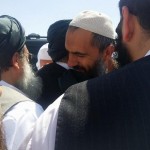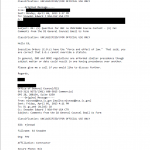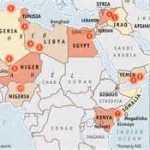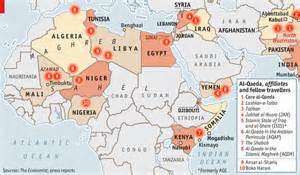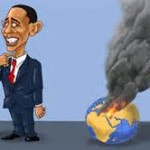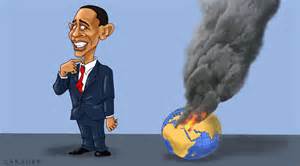The list of traitors to America is growing and the list includes many within the Obama administration. Remember, traitors are in violation of their oath and traitors joining forces with the declared enemy fall to treason.
Reminder: during the Obama administration we have had three attacks, Ft. Hood, Boston Bombing and Benghazi.
Several months ago, Saudi Arabia announced they were disgusted with the Obama administration over the matters in Syria and Iran. Saudi Arabia part of the Gulf States declared along with Egypt that Turkey and Qatar were no longer going to be part of a new coalition to fight the war on terror given Qatar especially has aligned and allowed Hamas and AQAP a supportive foothold in the Middle East. Sadly, the United States continues to recognize Qatar as an ally, knowing full well we are sleeping with the enemy.
For three years hence, U.S. State Department and the White House through Qatar has been negotiating with Haqqani and the Taliban for a misguided truce of sorts such that the United States paid through USAID for the Taliban to have a headquarters office in Qatar. Once that was exposed it fell apart. However, in March of 2012, during the negotiations with the Taliban, those leaders made a major demand of the release of 5 Gitmo detainees and May 31, 2014, the deed was done, Barack Obama fulfilled that request at the peril of future kidnappings, beheadings or worse.
For a real summary review of who the Taliban are historically, click here.
Yesterday, we learned that a covert operation occurred that Barack Obama used a U.S. citizen, once a PVT, but promoted to Sgt during his defection to the Taliban was at the core of a prisoner swap releasing the top 5 Taliban leadership from Guantanamo to Qatar. These Taliban had direct action in killing Americans and they were flown by America leaving Gitmo at 2 PM, Saturday, 5/31/14 for Qatar. The al Thani family in leadership in Qatar worked this deal and will keep the released Gitmo detainees under house arrest for a year. Barack Obama rewarded the Taliban and then brought home a defector, the moral equivalence of high crimes and misdemeanors.
There is NO higher proof that Bergdahl was a deserter when even the FBI was brought in to investigate the case. In 2010, the military deemed Bergdahl a deserter. The Obama administration has known for years that Bergdahl defected and Barack Obama used this traitor who left his unit and uniform behind to advance the Taliban, now successfully so.
The happiest man globally is Mullah Omar, and this site is a follower of Robert Bergdahl on twitter, while the father of Beau follows this site. Here is the joy expressed by Mullah Omar. Robert Bergdahl is in full solidarity with the Taliban and continues to work to free all Taliban prisoners. We can only assume and cautiously so the Robert Bergdahl has been given full immunity for his covert work supporting the Taliban while showing no remorse for the release of 5 Taliban personnel from Gitmo that are directly responsible for American deaths and those deaths of innocent women and children on a battlefield they created.
Beau Bergdahl left his Afghanistan post on purpose, unarmed except for a few knives and water seeking his Taliban friends. Radio chatter began that the military picked up and so the saga began. Bergdahl did not report for 9 am muster the next morning and the search began for weeks that included drones, exfil teams, search teams and roving land teams. The IED’s went off, the ambushes began and the false leads led to injuries and death of American soldiers all for a traitor.
Bergdahl wrote home more than once that he no longer wanted to be an American, he was sick of a country full of lies, so his parents knew he defected. Robert Bergdahl even boasted about working to release all the Gitmo detainees for the sake of the innocent that America had killed prosecuting the war against al Qaeda and the Taliban.
The timing of this swap is more than suspect given the fact the veterans and active military have come forward to expose the malfeasance and corruption within the Veterans Administration and Barack Obama did nothing for six years. Firing Shinseki was required and larger aggressive measures could have happened under his watch and that of Barack Obama to cure the corrupt VA least of which could have been at the signature of Barack Obama by Executive Order. Now, how is it that the parents of Bergdahl just happened to be in Washington DC over this weekend, the very moment that the son is rescued? This plot was exposed on national TV filmed from the Rose Garden?
Now, Barack Obama says the al Qaeda leadership has been destroyed and the measures to defeat the Taliban is within the grasp of Afghani forces. Given the 5 Taliban senior leadership that Barack Obama released, tomorrow the war on terror will be at least as bad as it was on 9-12-01. The blood and treasure spent in Iraq, Afghanistan and beyond has been for nothing now and al Qaeda is on its way to expand and fulfill their mission, defeat America and NATO forces.
The White House knew Bergdahl was a deserter, the State Department knew he was a deserter the military knew he was a deserter, the proof is there given all the cables from 2009, the emails from Bergdahl and the radio transmissions.
There is no single betrayal that is bigger than what Barack Obama approved, releasing top Taliban leadership to get a deserter returned all for regaining political capital.
National Security just went into a crisis DEFCON condition. The Senate was not advised of this covert White House action which is a violation of law. No higher price has America ever paid yet on the war on terror than this single reprehensible mission of Barack Obama.
In case there is any question on why this swap transaction is dangerous beyond definition, one only need to understand a previous Gitmo detainee Mullah Abdul Qayyum Zakir. The Department of Defense has graded Guantanamo prisoners with regard to future threat assessments. Zakir was ranked medium risk and sadly that proved to be wrong.
The matter of being attacked on 9-11-01 has been dismissed by Barack Obama and his conscripts.

